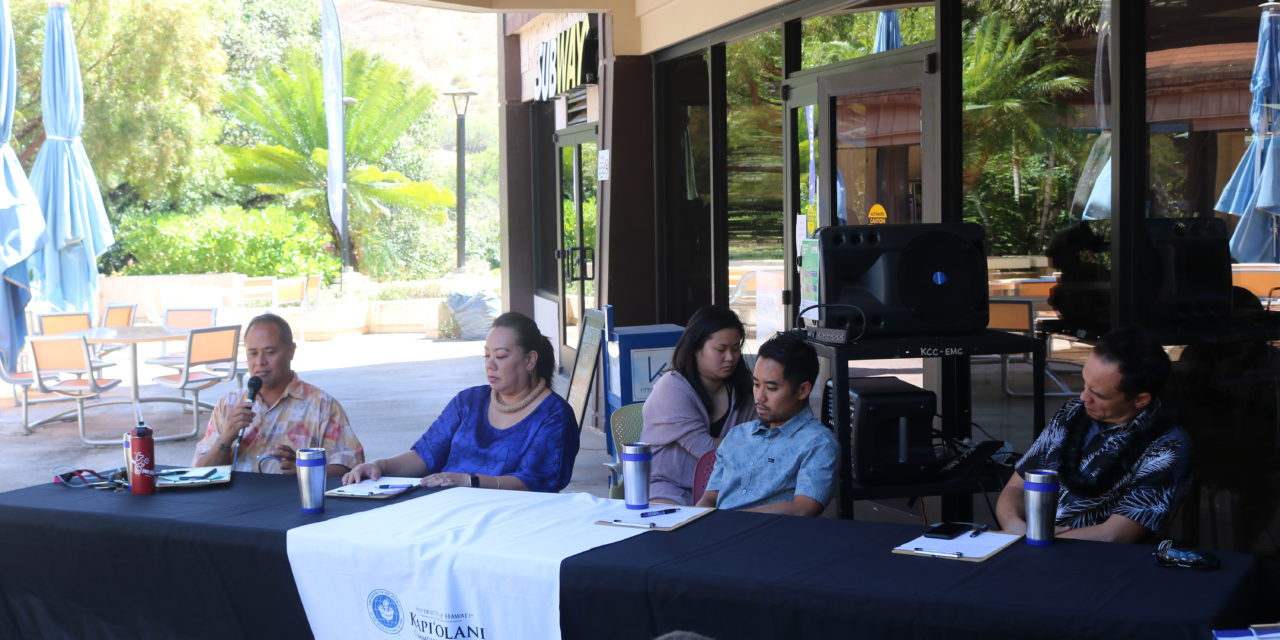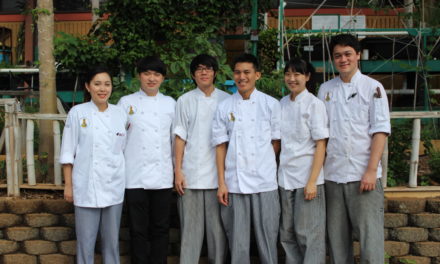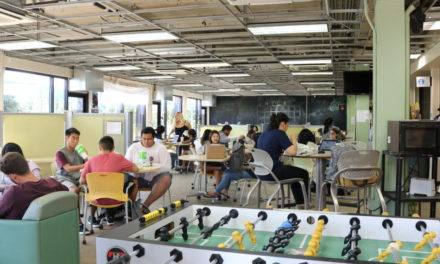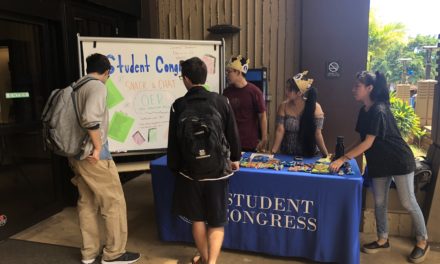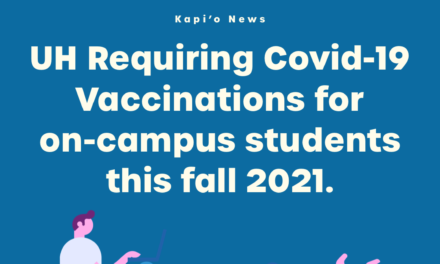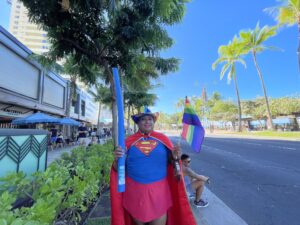BY SAM EHRHART | STAFF WRITER
A panel was held at KCC to talk about the topic of Environmental Sustainability on Monday.
The panel included guest speakers Matthew Lynch, Helene Feagaimaalii, Mahi La Pierre, and David Aquino. Lynch is the director of Sustainability Initiatives for all 10 UH campuses, Feagaimaalii is the Food and Beverage director at the Hawaiʻi Convention Center, La Pierre is an educator and artisan at Papahana Kuaola, and Aquino is the current director of the Blue Planet Foundation. The event was hosted by Su Lazo, a member of the employment prep center, and Angela McGough, a coordinator at KCC.
The four panelists spoke about their careers, their organizations’ accomplishments, and why students should have interest in the sustainability field. These organizations all share the same goal of creating a healthier Earth, however, their methods are different.
“Did you know that UH Mānoa is a $400 million research outlet?” Lynch asked the crowd. “From that research, UH focuses heavily on adopting clean energy practices for its campuses.”
Lynch became interested in the sustainability field after he worked with Food Systems in Mongolia. He saw firsthand how climate change ruined their native hunting and farming styles that their people practiced for thousands of years. Feeling saddened, Lynch decided to pursue a job in sustainability.
Hawaiʻi Convention Center’s goal is to provide food and beverages with zero emissions. This means that the center cannot have any food from the mainland or from international locations, all of the food has to be grown or raised on Oʻahu or the neighbor islands. The Convention Center is not allowed to ship bottled water either; it only serves water from the Hawaiian Islands.
“We only cook food that the Native Hawaiians made,” said Feagaimaalii. “We connect with our ancestors and learn what they ate and lived off. It’s pretty challenging when you learn that you must cook without sugar, salt, pepper, baking goods, and other common cooking items. We once completed this task to feed 500 people three meals a day, for five days.”
Hawaiʻi Convention Center prides itself on its “Gold Standard Award,” according to Feagaimaalii. This award is given to a business or building that has great water, amazing waste management systems, and maintains low energy consumption rates. A goal of the Hawaiʻi Convention Center is to plant 1 million trees. According to Feagaimaalii, many trees have already been planted on Hawaiʻi Island and on the North Shore of Oʻahu.
“You can adopt a tree and watch it grow,” Feagaimaalii said. “You can use a barcode to keep a close eye on your tree and see it mature throughout the years. We hope that this will encourage people to be more sustainable”.
Blue Planet is an organization that supports clean energy in the islands. This organization does many school events to get children involved and interested in the field of Sustainability. The organization also assists Hawaiian Electric with its work.
“Blue Planet switched every lightbulb on Molokaʻi from high-energy ones to LED energy saving bulbs,” Aquino said. “We support and promote the usage of clean energy throughout Hawaiʻi”.
Aquino is a native from Oʻahu and he was once in pre-med at UH Mānoa. He joined a group called “Sustainable UH” that gave him extreme interest in sustainability efforts. Aquino switched his major because of his love for the island, he especially wanted to protect the coral reefs and other aspects of nature that he came to love.
“I wish that I knew more about the depth of sustainability when I was younger,” Aquino said. “I figured out that good mentors and being passionate about a topic are definitely important to success.”
Papahana Kuaola is an ʻāina based, non-profit organization that hopes to provide education about Hawaii’s native cultural and natural resources to the community. The organization’s property grows plants that are important to Native Hawaiians, mainly kalo, ʻulu, and taro plants.
“Papahana Kuaola has a stream which is so clean, you can drink from it,” La Pierre said. “There are freshwater prawns and catfish that live in the stream, so we catch them and eat them. A couple days ago we caught a wild boar that was harming our crops. We killed the boar, cooked it, and fed ourselves and some of the local community. We just want to teach people how to live off the land like our ancestors did, in a clean and efficient way.”
La Pierre originally was a member for the U.S. Air Force for two years, and he later went to HCC’s art program. He got a job as a janitor at the Miilani Nature Conservancy. Feeling interested in what was happening at the conservancy, he changed his major and started to work as a member of the Nature Conservancy. La Pierre calls himself a “science nerd.”
Each of the four panelists unanimously agreed that knowing about Hawaiʻi’s culture is critically important to understanding sustainability. The panelists viewed that the topic of Hawaiʻi’s cultural practices connect us to the environment and that we must protect it. The guests believed that by understanding Hawaiʻi’s culture, people can spread that mentality to daily life and to areas outside of the state. One of the most important ideas the panelists argued, is that the idea of aloha should be expressed everywhere.
“Students today should know more about sustainability,” Lynch said. “This topic affects them more than they know. I think that the word ‘sustainability’ is deeply misunderstood, but it is a really important and intense topic.”
The panelists want students to know that the field of sustainability deals with many different areas besides the specific study of the environment. This subject also has job opportunities in photography, video creation, and web design to spread information about environmental work. The four guests also stated how the sustainability field is having an increase in job positions that need to be filled, many of them have decent salaries. The panelists agreed that the field of sustainability has amazing people who want to help the world.
“You, as a person, shouldn’t be living your life as a paycheck,” Lynch said. “There’s a spot for you in the world to fill in the gaps that are needed to stop a disaster from happening that humans are facing. You are important, we all are.”
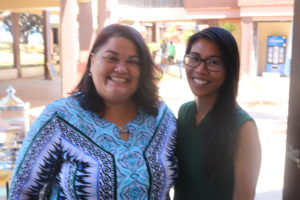
Angela McGough (left) and Su Lazo (right) hosted the Sustainability panel on Monday. (Photo by Sam Ehrhart)
Lazo — one of the hosts of the event — had two main goals in her mind. She wanted to inform students about the sustainability career path, and she wanted to connect them to possible future jobs that they may dream to have.
“I think that this topic [sustainability] is really important,” she said. “The food we eat and the oceans we swim in are all linked together. Our future generations can possibly lose these things if we do not do something now to protect them.”
Lazo has already hosted two career panels earlier in the semester, one for entrepreneurship, and one for staff services. Lazo plans on corroborating with other KCC offices to do more future career panels for students in the Fall 2019 semester. At the end of these panels, Lazo gives students who attended a little survey to complete. The survey asks questions and has sections for students to give feedback.
“The validation of these student survey sheets show that students are interested in these panels and that they give them helpful information,” Lazo said.
Students at KCC who are interested in sustainability can sign up for the new “Academic Sustainability Certificate,” which is the equivalent of a minor in sustainability. Students who are interested in the certificate should contact Wendy Kuntz, a professor at KCC who is the coordinator for the academic certificate.

